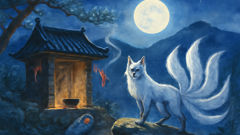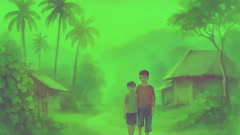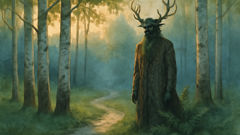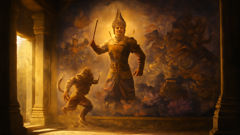Introduction
The night the mountain swallowed the last crimson of autumn, a child was laid at the small stone shrine to the Sansin, the mountain spirit. Wind combed the ridges of the pines until they sang, and the shrine’s candles flamed and guttered like fearful lungs. No human eyes witnessed the woman who set down the swaddled bundle and bowed three times, her hanbok hem wet with mist, her breath cutting white ribbons in the cold. But the mountain watched. A pale fox, white as rime, watched. She had nine tails that moved like the strokes of a calligrapher painting the air, and her name was Yeon. In the hollow of her throat glowed a bead the color of moonmilk, where the hungry and the immortal and the foolish could all lose their way. Yeon did not lose hers. She knew the rules. The gumiho survives on secrets and souls, on the breath stolen from those who desire what they cannot keep. She knew how to become a woman with hair like ink and a smile sharp as a blade of frost. She knew how to live on the lip of human houses, taken for a wisp of fog at dawn. But she also knew the old stories that foxes told only to each other, the stories with endings that cut like bamboo: if a gumiho ever gave her heart wholly to a human, her tails would fall like leaves, and her bead would dim and crack as ice under a traveler’s foot. Yeon meant to leave the child. She meant to pass the shrine as she always had, a rumor among needles of pine. Instead she paused. She listened past the wind, past the creak of bare branches, to the tiny cry that is more prayer than sound. Her ears twitched. Somewhere, far off, monks beat their moktak and poured tea for invisible guests. Somewhere, nearer, a tiger spirit laughed at the foolishness of men. The child cried again. Yeon stepped closer, and the bead at her throat warmed in a way that felt like pain.
White Fox by the Shrine
Yeon had fed that evening, not on flesh, but on desires. There is a quiet orchard above the village, and in it a scholar’s widow, kneeling before a persimmon tree, had whispered an old lover’s name to the roots. Yeon had taken the shape of the name as it left the woman’s mouth, breathed it in, and let it dissolve across the bead at her throat. It was enough to keep her clever, enough to keep her tails fanning like banners behind her when she ran. Full-bellied, she should’ve passed the shrine, should’ve chased the wind to its lair and slept with her nose tucked under her own tail. Instead, a single human cry caught in her fur and would not shake loose.

She crept to the shrine on soft paws and watched the bundle shift. The child’s scent was clean water and new rice straw, with an old grief threaded through it like a black hair in white silk. Yeon changed—bones rethreading, fur smoothed into skin, tails drawing inward like nine breaths held. Now a woman knelt before the shrine, her hair unbound, her cotton jeogori pulled tight against the cold. She touched the baby’s cheek with a fingertip. Warm. Alive. The child blinked and made the small, stubborn sound of a heartbeat refusing to be mocked by wind. “Who leaves a child in the month of frost?” Yeon murmured, and the mountain answered with silence. On the stone platform rested rice cakes, a bowl of chestnut porridge gone cold, a copper coin faced up for luck. Some love was here. Some terror too.
The old rules rose like thorns. A fox who empties her heart into one vessel finds herself unmade. Humans were vessels like cracked ceramics—good for tea, bad for wine, always thirsting. Yeon should leave the child to the Sansin’s mood, or to a passing monk, or to the cold that would take even a fawn in a single night. But the baby’s fist caught the edge of Yeon’s jeogori and held fast with the soft strength of a sprout pushing through ash. The bead warmed again, and for the first time in a long life, Yeon felt something she recognized not as hunger, not as sport, but as invitation. If she took the child, the mountain would notice. If she did not, the mountain would notice. Either way, a path would be named.
She lifted the bundle and cradled it close. The baby was lighter than a gull feather and heavier than destiny. Yeon listened for pursuit—the creak of tree, the warning grunt of tiger, the whisper of monks’ robes. Nothing. She turned toward a ravine masked by a fallen pine, where an old badger had long ago abandoned its den. In that earth-warm hollow lay dry needles, a piece of faded silk she’d stolen from a bride’s chest, and a lacquered comb whose teeth caught moonlight like a fishnet. Yeon fed the coals of a small fire with branches she coaxed from dampness through a trick older than sorrow. She laid the baby beside the heat and examined the swaddling. Cheap cloth, but clean. The knot was tied by a hand in a hurry. No name was pinned inside.
Names matter. Foxes decorate themselves with names like trinkets: names stolen from men in dream, names traded among spirits, names scratched in bark and never spoken aloud again. A human child with no name was a ship with no carved figurehead—unlucky, easy to claim, easier to lose. “I’ll call you Ari,” Yeon decided. It felt like a round stone in her mouth, a small circle without corners where sorrow could catch. Ari opened her eyes and made a sound that was not quite a laugh and not quite a cry, and Yeon felt her bead hum as if in answer.
Days became measured by very small things: the rhythm of Ari’s breath, the flare of her hands, the way her mouth turned to the warmth of Yeon’s palm. Yeon hunted cautiously, far from the ravine, taking only what she needed and never from the same place twice. The mountain has eyes the size of bowls, and treads whisper-soft when it’s interested. Yeon felt it watching. She hid her tails under a quilt of pine boughs and sang old fox-lullabies that mapped the sky: here is the arrow of the archer, here the carp that learned to climb waterfalls, here the bowl of rice spilt on the black table of night. Ari slept. When she cried, it was a bright, angry sound that braided itself into Yeon’s nerves and tugged her upright, tugged her back from hunting, tugged her from the edge of mischief where she might have wrapped herself in a pretty girl and gone walking in the village lanes to listen for secrets like plums falling.
On the seventh night, Yeon took Ari to the shrine again. She brought a small offering: a hare caught cleanly, its spirit sent on with a word. She set the baby before the incense and bowed. “Sansin,” she said, “there’s a child with no name except the one I’ve given. If I keep her, will you count it against me?” The candles answered with sighs. The trees spun their coins of frost. Then, in the swirl of smoke, Yeon saw a shape: an old man with a beard like waterfall moss, a tiger at his side, a fan of nine pine-needles in his hand. He did not speak. He reached out and touched Ari’s forehead, very lightly, as if tasting snow. Yeon’s tails prickled. “I won’t steal a soul from your mountain,” she said. “I won’t eat the men who curse my kind when they should be cursing their own greed. I’ll keep to the skirts of your shadow. Let me have this one thing.” The smoke thinned. The tiger spirit flicked its ear and yawned as if bored, which is how tigers say yes.
Yet permission is not protection. Word walks faster than any fox. Hunters had been telling stories all winter about a white shadow slipping between trees, about hoof prints that were not hoof prints, about a woman at the inn whose laugh made a man forget his own wife. A monk from the valley temple came to the village market and warned mothers to keep their children close. The potter who sold roof tiles to that temple took the warning home to his wife. She dreamed of lost babies and woke to re-bind their sleeping son’s blanket with trembling hands. Someone, somewhere, would link a white fox and a child, and Yeon’s careful den would be a sieve for fear.
Ari grew. Her eyes, gray at first like winter water, warmed to the color of barley roasted for tea. When Yeon smiled, the baby smiled back with such whole-heartedness that a tail loosened from Yeon’s knot of magic, and she had to concentrate to hide it. There were rules, yes, and Yeon had obeyed them so long they’d become like the grooves in river stones—things she felt without thinking. But the rule she’d never tested was this: what you love remakes you whether you permit it or not. She didn’t want remaking. She wanted to feed Ari and keep her warm and teach her to listen to the stories stones tell at dusk. She wanted to keep her bead bright and her tails intact and go on being the cleverest root in the mountain’s tangle. Between wanting and getting lies a field where hunters wait.
One afternoon, when the sun sat fat and honey-colored on the ridge, Yeon carried Ari slung against her back in a borrowed wrapping cloth and, disguised as a young widow, walked to the village. She moved slow, head bowed, arms folded. No one sees a woman like that. The market was alive with winter’s bravado: red threads, charcoal dust, the iron scent of knives, the sweet brine of pickles. A row of jangdok crocks lined the alley, each with its lid tied down against the sky. Yeon bought millet with a coin she’d pulled from a bandit’s pocket months ago and a bundle of mugwort to make bathwater smell like mothers. A vendor with a smile cracked into a hundred sympathies reached for Ari’s foot. “Pretty child,” she said. Yeon’s heart became a startled fish. Her tails tried to rise. “Yes,” Yeon said, too quickly. “She’s mine.” The vendor nodded as if she knew about loneliness and let them pass. But two stalls later, Yeon heard a man say, “White fox in the east woods. Saw her tracks. You can smell their lies from a ridge away.” Another man spat. “Tear up their dens. Salt them.” A third laughed, nervous. “Let the monk chant. Foxes hate drums.”
Yeon kept her gaze on the ground. She didn’t smell any dogs. No hunters wore their pride like metal today. And yet fear is a net thrown into a river: it may miss the fish you aim for, but it catches a thousand smaller things. That night, back at the den, Ari coughed. A small cough, the kind that sleeps between breaths. Yeon warmed stones by the fire and wrapped them in cloth, set them near Ari’s feet, rearranged the world with the frenzy of love: tannin tea, willow-bark, a lullaby of steady syllables. The cough hid in Ari’s ribs and waited for dawn. When it returned, it was harsher, and Yeon heard in it the rhythm of a drum she couldn’t silence.
She carried Ari to the shrine again and laid her on the stone, careful as if placing a mirror that remembered the face of the dead. “Help her,” Yeon said to the mountain, and the smoke rose, and the tiger spirit turned its back, indifferent as always to human suffering. The Sansin’s shadow did not stir. “Then I’ll collect the help myself,” Yeon said, and wrapped Ari close, and turned down the path toward the village, toward the leaking warmth of human houses, where there was always someone who knew a plant and a prayer and the exact length of a night.
Village of Smoke and Persimmons
The village lived by the river’s patience and the mountain’s temper. Its lanes bent like reeds in flood, its roofs hunched like turtles, and its gates boasted jangseung totems whose wooden faces grinned and grieved in equal measure. Yeon took the shape of a widow who had walked hard and spoken little. Ari lay against her back, a warm moon between shoulder blades. The first house she came to was that of a potter whose kilns glowed like dragon bellies all night and slept by day. She knocked because smoke understands smoke.
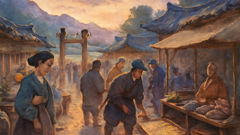
The potter’s wife, Dallae, had hands shaped by clay and sorrow; she looked at Yeon, then at the knot that held the child. “You’ve walked with a fever,” Dallae said. “Come in.” It wasn’t a question. The house’s ondol floor breathed heat into their soles. Yeon felt a pain she remembered from long ago: the ache of shelter, which is the ache that says, here is a place to leave and long for. Dallae brewed ginger and jujube in a pot that had known laughter and arguments and rain. Her husband hovered like a spatula—useful only when needed—and set a stool by the table. “Baby’s cough?” Dallae asked, already lifting the cloth. Ari coughed obligingly, as if to name the enemy.
Dallae was a mother who’d memorized the distance between a child’s breath and a child’s silence. “Steam and rest,” she said. “And a blessing if the monk hasn’t gone back to the temple.” Yeon’s bead thrummed a warning. Monks knew the texture of fox-magic like the callus on a prayerful thumb. But time is a narrow alley when a child’s chest rattles. “We’ll try the steam,” Yeon said. Dallae set a pot on the brazier with mugwort and perilla leaves, and steam rose like a silk ladder. Ari’s lashes beaded with it. She breathed deeper. Yeon felt the mountain draw near as if to listen, and her tails stayed flattened, quiet, like cats watching a hawk slip by.
The potter came back from the market with news, which is to say with fear. “They say the white fox has taken a child,” he told Dallae, each word litigated for its own innocence. “The hunter saw tracks all around the east ravine. He wants to set iron jaws. He wants to ask the monk to beat the drums all night.” Dallae’s eyes flicked to Yeon, to the tight braid of her hair, to the way she held the cup with two precise fingers, like an aristocrat feigning hunger. “Hunters say many things,” Dallae replied neutrally. “They must justify winter.” Then, to Yeon: “You’ve the look of someone whose home became a question. My sister has the same look. Sit. Drink. Let me hold her while you rest your arms.”
Yeon let her, trying not to flinch when human hands took Ari. It felt like a test the world kept giving her: can you place what you love into the same air others breathe and not run? Ari burbled at Dallae’s necklace, a small bronze charm shaped like a carp. “She’s strong,” Dallae said. “Strong babies cough as if they mean it.” The monk did come by—a compact man with a shaved head that shone like a bright thought. He entered with the caution of someone walking among sleeping dogs. “Blessings,” he said, then paused. Yeon felt his gaze like a wet leaf. “Whose child?” he asked. “Mine,” Yeon said, and the lie, spoken simply, hung between them like a ribbon the color of daring. The monk nodded once, as if thanking her for its neatness, and beat the moktak softly while chanting words that had walked a long road to arrive in his mouth. The rhythm soothed Ari’s breath. It also stirred the bead at Yeon’s throat, the way a river stirs at a stone whose shape it cannot change.
After the monk left, Dallae said, “He knows more than he says.” Yeon shrugged the kind of shrug humans had practiced into surrender. “People always do.” Dallae smiled a little. “My grandmother used to leave rice cakes at the big pine that leans toward the old tiger’s den. She said some beings like rice cakes as much as prayers. She would’ve told your future by counting pinecones.” Dallae had that gift some women carry—the gift of treating danger as if it were a guest who drank too much, to be steered toward a corner with kind words and a watchful eye.
The hunter arrived as evening fell, wearing pride for armor and suspicion for gloves. He was handsome the way certain trees are handsome: straight, strong, impossible to take into a small room. He brought iron traps wrapped in straw, and the smell of old blood trailed him like a second belt. “Fox tracks,” he said, without greeting. “We’ll lay for her near the ravine.” The potter’s mouth tightened. Dallae’s hands rested on Ari’s back. Yeon kept her face the map of a woman who had pulled her life tight and pinned it to her skin. “Have you seen a fox?” the hunter asked her suddenly. She lifted her eyes and let him see one truth embedded among safer ones: “I’ve seen many things in the hills. None of them come when called.” He laughed, surprised into respect. “You’re a widow?” “I am something like that,” Yeon said. He nodded at Ari. “Careful. Foxes love to steal breath. They suck it right from a baby’s mouth at dawn.” Yeon forced her shoulders not to rise or her tails to unfurl and strangle his fear into silence. “So do fevers,” she said, very evenly. The hunter looked at her as if he had heard a bell when he expected a bird. He left without blessing.
Days lengthened. The steam and the monk’s measured chants and Dallae’s good hands made Ari’s cough ease. Yeon drank those small mercies like broth. To repay them, she fixed the potter’s roof in the night, balancing along beams as a fox just beneath her skin taught her to step where there’s whisper, not creak. She carried split logs to Dallae’s door and made a joke about generous woods. She noticed the way the village children’s games drew an invisible circle and left out one boy with the kind of hunger that made bullies brave. She told him a story about a carp who let itself be caught so it could bring luck to the bucket. The boy brightened and left a barley biscuit by Dallae’s gate the next morning, because some debts should never stand up and introduce themselves.
But safety is a bubble under a pot lid. It gathers, trembles, bursts, gathers again. The hunter found a feather snagged in brambles: white, fox-soft, not a bird’s, and in that small mistake the world pointed a spear. He and two men climbed to the east ravine and set the iron jaws under leaf-litter. The monk, who knew many ways to say beware without lighting any fires, went house to house reminding mothers to bring in the laundry at night, to tack a red thread across thresholds, to hang a string of garlic where it would not mock the nose. Dallae’s little boy, who wanted to be brave like the stories said he might be, brought Yeon a handful of sweet rice and said “For Ari,” and his kindness made Yeon’s bead glow like a lamp cupped by both hands.
Then, as if fear must always invent a host, the fever that had sulked in the back of the winter finally ran its fingers through the village. Children burned like kindling. Old men sweat like rivers. Women measured their nights by wet cloths and counted their dawns by the number of names they did not speak. Yeon felt the fever look for Ari as surely as she felt the hunter look for her. The two hungers nearly shook hands. She held Ari all night, whispering subtraction problems to the air as if numbers could set the world back into balance. “Eight tails visible is still nine tails,” she told herself when the edges of her control frayed. “Ari’s breath is my breath. My breath is the mountain’s. The mountain owes me nothing. I owe nothing back. Take only what you need. Give only what’s not asked for.” But love keeps its own ledger.
Word came that the hunter had seen a woman feeding a fire in the ravine, and the smoke rose in the shape of a fox tail. Men like to see shapes; it makes the world less slick. He returned with more iron, and with a rumor as bait: a fox had stolen not just breath, but a child. Whose child? Someone had left a baby at the shrine. Someone had seen tracks, yes? Someone had heard a cry. A fox’s cry can sound like a child’s, and a child’s cry can sound like a fox. The rumor wrapped itself around the village throat. Yeon watched the loops tighten.
She went to the monk in the afternoon when the sun was a dull coin. “Master,” she said, and the word was oddly easy in her mouth. “What do you do when water rises on both sides of a bridge?” He looked at her for a long time as if turning a bowl to find its flaw. “You choose whom you carry,” he said. “Sometimes you set down your load and step into the flood so another can stand where you stood.” It was not the answer she wanted, because it did not tell the river to be fair. But it was the answer she expected, because the river never is.
That night, a boy went missing—Dallae’s nephew, who had a habit of following shadows to see where they ended. He’d wandered into the east woods after a glow that might have been fox-fire or the stubborn curiosity of a moth. Panic snapped the village like a branch. The hunter took up his bow and shouted orders. The monk lifted his moktak and prayed to the spaces between syllables. Dallae tied on her sandals with a face she reserved for days that changed everything. Yeon tucked Ari close and brought her bead to her lips. “Stay,” she told it, as if power is a dog that can be made obedient by good sense. The bead warmed, wanting to be used. Fox-magic is a lever; when you pull it, something somewhere moves, and sometimes it’s not what you planned.
Yeon moved through the forest with a speed that left her human shape behind like a discarded sleeve. The night made space for her. The iron jaws the hunter had set grinned up from leaf-litter, dreaming of bone. Yeon leapt them, though the last hissed against her fur. She found the boy huddled at the base of a fallen cedar, eyes wide, a small cut on his forehead where the forest had refused to make way. “Come,” she said in fox-syllables, which are not heard so much as felt along the nerve that separates panic from relief. He looked at her and saw a white dog, perhaps, or a dream of rescue that needed no name. She took his sleeve gently in her teeth and led him along a deer trail toward the lantern lights that bobbed like captured stars. The hunter spotted them and raised his bow. Yeon saw the arrow’s neon thought before the string sang. She twisted, took the boy’s weight on her shoulder so the arrow hissed past and struck a birch with a sigh. Men shouted. Dallae called the boy’s name and it lit the trees like summer. He ran to her and she caught him, and Yeon, who could have vanished into dark, stayed a heartbeat too long. The hunter saw her miracle without the coverings fear prefers: a white fox, eyes full of a child’s face, tails lifted like a halo, still as a confession.
His second arrow aimed not at her heart but at her bead. He was a man who knew what shines and why. Yeon moved but he was quick, and his arrow nicked the bead’s edge. Pain like a cracked bell sang through her. One tail unspooled into darkness and dissolved as if it had never balanced her. The monk, who had arrived sweating, saw the ready death and beat the moktak so hard the night stumbled. “Leave it!” he shouted, voice raw with a fear that had nothing to do with foxes. “Leave it, fool!” The hunter’s arm lowered a fraction. He saw Dallae’s nephew alive. He saw Yeon curve herself between villagers and their rumor of a monster. In a world that loves the ease of categories, he had been offered a difficulty. He did not take it with grace. “Tomorrow,” he said loudly, to his men, to his anger, to his future: “We set more traps. We beat the drums. We drive this creature out. I want that bead.” He turned away because he could not yet bear the weight of the arrow he had not loosed.
Yeon returned to Dallae’s house with Ari in her arms and the bead trembling at her throat as if humiliated by the thought of breaking. Dallae cleaned the cut on Yeon’s shoulder without remark about fur or woman, because some women hold their questions the way they hold boiling water—with cloth, for as long as they must. “Thank you,” she said, and meant it in a hundred dialects that do not require a fox to have a mother’s hands. Ari slept, cool and steady, cheek pink as a pearl.
By dawn, the rumor had grown new teeth. Ari’s cough sharpened again, as fevers often make their last attempt when the day is set to begin. The hunter walked with two men toward the eastern ravine, carrying iron and certainty. The monk went the other way, toward the shrine, carrying neither. Yeon stood in the house of smoke and persimmons with a baby whose breath was a string she could count now between her own. Choice, like a seed, had been planted where she could not avoid it; now it cracked and sent out its blind root.
The Ninth Tail
The mountain carried stories the way a bear carries burrs—accidentally, inevitably. It carried Yeon’s story now. In the gray hour before the sun chooses, she walked back to the shrine with Ari bundled tight, her bead a cool moon against her skin. She set Ari on the stone and pressed both palms over the baby’s small chest as if to hold warmth there by force. “Sansin,” she said. “I will give you anything that’s mine to give. But she isn’t mine. She’s only in my hands.” The incense had burned to ash. Frost made the world a chalk drawing. Yeon closed her eyes and saw nine tails unfurled behind her like roads branching toward nine fates. Eight led to solitude with style: a sly life, a safe den, a slyer death. One led to something she did not know how to name, though humans had a word for it as common as rice and as misunderstood as winter: mother.
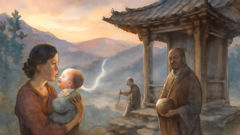
The fever in the village was a many-legged thing; it crawled into houses and hid under blankets and wore the faces of children. It would come to Ari as surely as rain arrives after clouds make plans. Yeon had three choices, though in truth there is only ever the one: to run, to fight, to give. To run meant leaving the river of rumor to swallow the village and to drown the child’s future in a story about monsters. To fight meant teeth and trap-jaws and a bead like a blade, and the hunter’s death would add a hot coal to a fire already greedy. To give meant offering her tail-lengths, her bead-light, her slyness, to the old law that says a fox may become woman and remain so if she empties herself into an act the world will remember longer than its fear.
She remembered the monk’s words about bridges. How many had she crossed, weightless? How many had stacked under her careful feet? She remembered Dallae’s quiet competence, the potter’s muttered gratitude, the boy’s sweet rice crumbling like an early thaw. She remembered the way Ari’s breath had synchronized with her own until Yeon didn’t know which was the original and which the echo. She remembered being hungry. She preferred being full.
In the east ravine, iron teeth starred under leaves, waiting. The hunter and his men—men with anger like belts, men who took off compassion at the door like wet shoes—crept with the carefulness of those who plan to be sorry later. The monk sat on a stone near the shrine, head bowed, not in prayer but in listening. When Yeon came, he stood, as one stands when a guest arrives who has the right to alter the room. He did not pretend not to know her. “If I had a drum,” he said, “I would not beat it.” She nodded. “If I had a tail more than I should, I would not flaunt it.” They smiled grimly, equally tired of their own clichés and of the world that made them serviceable.
“Help me,” Yeon said. The monk glanced at Ari. “I will keep witnesses gentle,” he said. “But I cannot bargain with a mountain that is enjoying its drama.” “Then bargain with me,” she said. “I am not a mountain. I’m something smaller and more stubborn. I don’t need the Sansin’s permission to love.” He looked like a man who had found a pebble in his shoe only to discover it was worth more than the shoe.
Yeon loosened the cloth around her bead. Fox-beads are not jewels, though humans pretend they are because jewels can be bought and lost and found again to the envy of friends. Fox-beads are the condensed breath of a thousand moments in which a choice was made to turn toward cunning instead of kindness. They are what glows when a story is told in the key of survival. Yeon held her bead and thought of a different key. She pressed the bead to Ari’s lips, and at first nothing happened, because miracles enjoy the attention of pauses. Then the bead softened—not into liquid and not into light, but into something like a son or daughter of both. Ari’s small mouth took it in with the trust babies afford the world for a very short time. Yeon swallowed back a fox’s instinct to pull away what was hers. She held still.
Her first tail let go. It drifted on the air like a sleeve caught by a thorn. Then the second. Each tail was a story: the year she harvested lovers’ secrets and wove them into a net, the winter she guided a lost soldier to warmth and took only his memory of a cruel order, the spring she tricked a snowmelt into making a mirror so a vain magistrate fell in love with his own ugly. With each tail gone, the bead dimmed, and the mountain, which had leaned in like a gossiping aunt, sat back, chastened and more interested than before. Yeon watched herself diminish with the peace of someone signing away land she never truly owned. The monk looked as if he had been permitted to witness a bowl becoming empty on purpose.
Ari coughed once, a small cough, and then breathed in. Her chest expanded like a kite catching a good wind. Yeon felt her own lungs argue and then comply with a new rhythm, as if she were adjusting her step to match a friend’s. The third tail detached, and the wind caught it, and for a breath the air smelled like roasted barley and cedar. The fourth and fifth fell together, like impatient sisters. Pain laced the gaps between Yeon’s bones, but it was clean pain, the kind that has a destination. She could no longer feel the mountain reading her mind like a poem with many authors. She felt, instead, a quieter thought: a new body writing its rules.
Below, in the ravine, the hunter’s iron jaws snapped on emptiness, and he swore because emptiness is the most infuriating quarry. He tipped his head, listening, and heard a drum that did not sound like the monk’s but like his own blood arriving at a decision. He turned away from the traps and walked toward the shrine, drawn by a magnet he could not name. The men with him called but their voices fell short, like arrows shot into wind.
Sixth tail, seventh. The world rearranged around Yeon as if to make room. She knew, with the knowledge that lives in bones and not in brains, that when the ninth went she would not call the tiger spirit and ask it to count. She would be appeared in a register somewhere as woman, not fox. Her bead was almost gone now, but not broken; it was being translated into a language a body speaks at dusk when it feels safe inside a small house. “Are you afraid?” the monk asked softly. “Yes,” she answered, without believing that fear was a mistake. “I’m also in love.” “That is the same thing,” he said, and for once they were both pleased to have said something true and obvious.
The hunter crested the rise and saw them: a woman with her hair loose, a baby in her arms, a monk beside her like punctuation, and behind them the faintest whisper of tails dissolving into morning. He drew an arrow because muscles remember grim habits. Yeon turned to him with a look that did not ask for mercy and did not fear its absence. “If you must shoot,” she said, “aim for the story, not the throat.” He paused, baffled into stillness by a sentence he could not hear himself say later with pride.
The eighth tail fell; it went like a laugh, surprised and unwilling to be put on the shelf. Ari’s eyes opened. They were barley-colored, but in their center lived a small, patient winter. She looked at Yeon and reached her tiny hand toward the place where the bead had been. Yeon leaned close and pressed her forehead to Ari’s. “You’re not mine,” she whispered again, “but I am yours.” The ninth tail loosened with the sigh of a widow taking down her hair at night. It did not float. It did not fight. It simply became light and then nothing, and the absence it left was not a wound but a door.
Something changed in the air, the way air changes when a storm decides not to ruin a wedding after all. The tiger spirit, bored as ever by the predictable and fascinated by the rare, sat up and watched with the lazy dignity of a king’s uncle. The Sansin lifted his pine-needle fan and let it fall, which, for such creatures, is a cheer. The monk’s shoulders loosened. He had feared for his faith that it could not stretch far enough to abar a fox’s love. It stretched. The hunter lowered his bow because he was honest enough to know he had no enemy here, only a mirror that reflected him kindly if he wished to be kind.
Ari took a deep, untroubled breath and yawned, as if the world had finally remembered to be gentle. Yeon looked down and, for a moment, saw both shapes she had been braided into—fox and woman—laid side by side like two lengths of cloth about to be sewn into a garment fit for work. Then the pause closed, and she stood there as a mother, with no bead biting her sternum, with no tails balancing her, with a future that would have laundry and nettle soup and arguments about slippers by the door. She laughed, surprised by the human sound of it. It was less pretty than fox-laughter and more expensive.
The hunter approached slowly. Dallae, who had come running because she had a talent for being where the story tightened, arrived panting. Others gathered, drawn in twos and threes the way birds gather after rain. Yeon did not hide her face. “I’m sorry,” the hunter said, and the words were raw as a man’s palm unused to throwing away his weapons. “I have a job I thought was simple.” Yeon nodded. “It rarely is.” Dallae looked from one to the other and then reached for Ari as if cataloging the baby for bruises nobody could see. “Is she well?” “She will be,” Yeon said, feeling the truth check itself and agree.
Rumor, which had been ready to paint the fox as a thief of breath, painted instead a talisman. Mothers began to tie white ribbons at their doors to thank the mountain for sparing their children. The monk refused to confirm any miracle and refused to deny it. The hunter dismantled his traps, swearing under his breath at iron the way a man swears at his old self. He left a side of venison at Yeon’s door without a note because generosity embarrasses certain types of men if they can’t name it penance. Dallae, shameless in her gratitude, came each afternoon with broth and gossip and baby clothes that had belonged to her own child and might now see a second season under a new moon.
Yet magic doesn’t vanish; it migrates. The bead had been not consumed but translated, and its echo lived in Ari—not as power, but as capacity. She grew with the kind of attention that makes old trees straighten a little when she passes. She could sit still longer than most, listening to the floor’s warm breath. When animals came near, they held their own conversations with her eyes. The village dog that bit the hands of boys who teased it let Ari take bread from its mouth. A crow brought her a coin. She returned it to the potter and said simply, “Crow.” He accepted because there is no correct ritual for gifts that come with their explanation.
Yeon learned, as all mothers do, that sacrifice is not a single, perfect knife but a daily fraying. She learned which vegetables were cheap at dusk. She learned to stretch a piece of fish with radish and the right story. She learned to laugh with Dallae at men who teach their sons not to cry and then demand tea when their teeth hurt. She learned to sleep without the mountain rousing at her breath. Now and then she woke with a fox’s dream caught in her throat—a sprint along a ridge, a cold river, a moon like pearl—but the dream settled into a memory she could regard without wanting to bite.
One winter, years later, illness took Dallae suddenly, and the village carried her to the hill and sang her name until the tigers yawned in approval. Yeon held Ari’s hand and let tears come in a tidy line. The hunter married a woman who braided her hair while thinking of practical matters, and they raised children who believed in traps for rabbits and in leaving bowls of rice cake on rocks. The monk grew slower and more particular, correcting people’s quotations and their manners. He sometimes told visitors a story about a woman who had chosen to be less and become more. He never used the word gumiho. He did not need to.
There were days when Yeon felt the old world tug at her sleeve, like a child wanting to be swung. Once, when Ari was seven and had a fever from running faster than her legs knew how to brake, Yeon sat by her cot and almost called her bead to her. She put her palm on Ari’s forehead and said a fox-lullaby and watched the fever argue and then bargain and then settle reluctantly into a compromise with sleep. She understood that she had traded a lever for a ladder. The lever lifts quickly and dramatically, to applause. The ladder climbs steady and spills no soup. She blessed ladders.
Ari grew into a girl who asked narrow questions. “Where do stories go when nobody is listening?” she asked one rainy dusk. “They sleep in the wood grain of doors,” Yeon said, “and wake when you knock exactly right.” “Who is my father?” Ari asked, because children always aim for the locked drawer. Yeon said, “You were set carefully on the mountain’s table by someone whose face the river wove away. That’s a father, too.” Ari considered this and was satisfied, or at least willing to be until a better question arrived.
When Ari was twelve, old men began to mutter about marriage markets and good hips, because men inventory girls the way traders inventory bowls. Yeon tightened Ari’s hair ribbon and said, “You will not be priced.” The monk, ancient and delighted with his bones, told anyone who tried to appraise Ari that the village owed her more than a good match. “She’s our luck,” he said, telling the truth slantwise. The hunter, who had become the kind of father who worries about daughters as if worry is a job title, glared at boys who practiced archery where girls could hear them brag.
One summer, the river decided to own the village for a few days; water slid under doors and over intentions. Yeon stood in the doorway and measured the water’s fluency. Ari waded to the potter’s kiln and stacked the wood out of its reach. Later, when the river returned to its bed, frogs sang as if fees had been paid. The village cheered not because the water receded—water always recedes—but because their fear had not become gossip that time. Yeon marked a tally in her mind: the days won from the temptation to make monsters.
Years turned as neatly as pages. Ari’s hair darkened into a long ribbon she pinned with a simple silver pin shaped like a curled tail Dallae had once given Yeon, for luck or naming, neither of which can be refused. She learned herbs from Dallae’s sister and the way to place a bowl so that steam speaks to a young mother. She learned how to listen to the Sansin without buying anything. She sat sometimes by the shrine and pressed her palm to the stone that had once held her and felt beneath it the steady heartbeat of the mountain not promising, not threating, simply being the thing that outlasts promises and threats.
And Yeon—who had once worn nine tails like a crown—wore now a life like a garment well-cut: plain, durable, dyed the color of persimmons left to soften. The world came to her with its hungers and its songs. She managed both. Occasionally a strange traveler would pass through and tell a tale of a white fox who had stolen a man’s breath and made him forget his marriage vows. Yeon smiled and said she’d heard foxes prefer better dinners than promises. The traveler laughed and moved on, content with the sound of his own knowing.
The day the monk died, Yeon took Ari up the mountain. They brought rice cakes and the silver pin and a piece of charcoal. They laid the cakes on the stone and pinned the charcoal in the moss with the silver. The tiger spirit watched from a sunny boulder and blinked. “We would have you remember him,” Yeon said to the Sansin. The smoke rose with the serene ambition of smoke. Yeon felt what she had always felt—a conversation not aimed at answers. They went home by the ridge path, carrying nothing but the long day.
When Yeon’s hair began to silver in earnest, some nights she dreamed of a bead. In the dream, she held it not to her lips or her throat but in her palm, like a peach offered by a child. She woke with the taste of it on her tongue: memory, and something saltier. She knew then that she would one day tell Ari the whole of the story not because secrets rot but because love keeps better with air. She waited until Ari reached the age when girls can tell if a story loves them.
They sat on the ondol floor in winter with the brazier humming. Yeon poured barley tea. Outside, snow went about its unremarkable miracle. Yeon said, “I was a fox once.” Ari said, “I know,” with no drama, just as you know where someone keeps the salt. Yeon blinked. Ari smiled sadly. “The dog told me,” she said, and they both laughed because the simplest lies take the longest way around. Yeon told her the rest—all the threads she had cut, all the ones she had knotted, the bead’s taste of iron and starlight, the hunter’s arrow that had nicked pride more than pearl, the monk’s drum that had not sounded and still had saved something. Ari listened the way smart children do: not as if taking notes, but as if laying a table for guests she wants to feed well.
“What did it feel like,” Ari asked, “to lose your last tail?” Yeon thought of all the cheap poems she could make and spared them. “Like the moment before sleep,” she said. “When you know you are letting go of something, and you also know you are going somewhere worth the letting.” Ari nodded. “Then it was not a loss.” Yeon smiled. “Loss is only what we call a trade we don’t name yet.”
Sometimes, when the moon was bright, people swore they saw a white shape on the ridge. It was a crane, or a fog, or a story trying on its old clothes. The hunter, long retired from iron and apologies, would sit by his door and be grateful for the ache in his knees. He would tell his grandchildren that monsters come softly sometimes and ask for a cup of water and leave rice in the bowl. They would laugh and run along the lane where the jangseung watched with their eternal grimaces and their equally eternal good humor.
One midsummer, a woman climbed the mountain at dusk and left a small child at the shrine. Yeon, older and undeniably human in all the ways that count, felt the mountain catch its breath. She and Ari went together. They found the baby asleep, not crying, and wrapped in a cloth embroidered with little fish. Yeon lifted the child and felt no bead stir, no tail tug, only the remembered weight of beginning. Ari smiled, the kind of smile a person makes when recognizing a particular curve of road. “What will we call her?” Ari asked. Yeon said, “We’ll ask the river,” because she had learned that some names only arrive when water has spoken them to stone first. They took the child home, not as a test, not as a plea, but as a sentence the world had already started and that was their privilege to finish, with good punctuation and no hurry.
And in time, when Ari herself held the hand of a child who called her mother, and Yeon watched them walk toward the river with baskets and a plan for dinner, she felt no tug toward a mountain she had long ago chosen not to own. She felt instead the profound vanity of survival giving up its chair for the quiet pride of being ordinary. The Sansin, immensely entertained by humans learning the trick of devotion one stubborn season at a time, fed a piece of persimmon to his tiger. The tiger chewed and licked his whiskers and thought, mildly, that this village had earned a particular patience from the mountain and even from the foxes who prowled its stories.
The legend of the gumiho’s child traveled downriver and up, carried by merchants who traded in salt and tales. In one town, the story picked up an unnecessary prince. In another, it lost the monk and gained a shaman with a drum the size of the moon. In yet another, a woman said, “I knew her,” and she meant Dallae, because we all translate heroes into people we might have invited to tea. But in the village where the mountain actually watched and the tiger actually yawned, the story stayed closer to the truth: a fox loved a child more than she loved the trick that made her fox; she gave away what she had been and in return became what she could be. They did not call it miracle. They called it neighbor.
On the day Yeon died, it was spring. Ari was at her side with a bowl of rice she did not expect her mother to eat. Yeon said, “Put it on the stone later, for me. For whoever comes hungry.” Her breath went out like a tide that had read the calendar. She did not become a fox again. She did not need to. She had been the bravest thing already, and once is enough when you do something properly. Ari placed flowers by the shrine and sang a lullaby that mapped the stars. A wind came down the ridge that felt familiar and very old, and she imagined she heard a tired laugh that used to belong to a fox.
Children still run at dusk in that village. They play at being tigers and monks and wind. Sometimes one child, more thoughtful than the rest, will pause at the shrine and press a palm to the stone and feel under it the hum of a story still working on its ending. The hum is not the bead; it is not tails; it is not even mountain. It is the sound love makes when it houses itself where it can be found again without a map.
Conclusion
People say legends are larger than life, but the ones that last are smaller than a house and warm as a kitchen. The story of the gumiho’s child endures because it knows how to live inside ordinary days. It knows the weight of a baby and the ache in a hunter’s arm when an arrow isn’t loosed. It remembers the smell of Dallae’s ginger tea and the way a monk’s drum can save a life by remaining silent. It leaves offerings of rice at a shrine without boasting and lets white ribbons flutter from doorways without asking for a parade. In a mountain village of South Korea, a fox chose a human child and, in choosing, remade herself more completely than any magic ever could. The Sansin still listens. The tiger still pretends indifference. A mother still counts breaths. And somewhere a child with barley-colored eyes asks a question that opens a door. If you walk those ridges in late afternoon and the pines sing and frost clings to their needles long after the sun has turned away, you might feel a soft tug at your sleeve. It isn’t a tail. It’s the past, offering to carry your basket for a while, asking nothing but your willingness to call a neighbor by the right name when you meet them again in the market, and to leave a rice cake on a stone for any traveler whose road grows suddenly longer.

